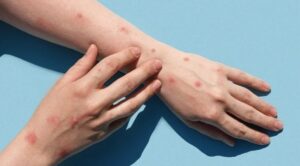
The EU Health Safety Committee has concluded that there are no grounds to consider the situation in the European Union in connection with the cases of monkeypox an emergency, European Commission (EC) spokesperson Stefan de Kersmaeker said.
“Our approach is based on scientific evidence, and it served as the basis for our discussions at the committee meeting the day before. The European Commission and EU Member States met to discuss the situation and consider how to coordinate the next steps. The Health Safety Committee agreed that there is currently no emergency situation in Europe concerning monkeypox,” the spokesman said at a briefing in Brussels on Tuesday.
He referred to an analysis published on August 16 by the European Center for Disease Prevention and Control, according to which “the overall risk to the population remains low at present.”
The EC representative also said that the committee members agreed on the need for a coordinated approach to this problem and close monitoring of the situation.
Answering a question about the availability of monkeypox vaccines in the EU, de Kersmaeker noted that the COVID-19 pandemic has shown the importance of preparedness for health crises. He said that since 2022, several contracts have been signed with different companies, and these vaccines have already been distributed to Member States.
“Our latest joint framework contract provides for the purchase of up to 2 million doses of vaccines,” the EC representative added.
Monkeypox is a rare viral disease. The infection is accompanied by fever, intoxication, swollen lymph nodes and further spread of the rash – first in the form of spots that transform into bubbles, after opening them, ulcers form, after they heal, crusts form, and when they fall off, scars form. In mild cases, the disease usually resolves on its own and lasts from 14 to 21 days.
Last week, the WHO declared a public health emergency of international concern due to the outbreak of monkeypox in Congo and other African countries. This year, more than 14 thousand cases of the disease have been detected in Congo, with 524 deaths recorded.
Earlier, the Experts Club information and analytical center released a video with a detailed explanation of the origin of the disease and the prospects for its spread – https://youtu.be/YXYU6KcQTcQ?si=wEj2TQc3MPHGx0QY
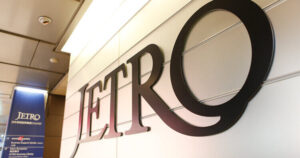
The Ministry of Economy has registered a representative office of the Japan External Trade Organization (JETRO), which will soon open in Ukraine.
“The opening of the JETRO office in Ukraine is a strategic step, the result of productive negotiations with the government of Japan, and marks the beginning of a new era of cooperation between our two countries,” Taras Kachka, Deputy Minister of Economy and Trade Representative of Ukraine, was quoted on the ministry’s website on Tuesday.
“We strive to create an attractive business environment that will attract Japanese investment and promote a strong partnership between Ukrainian and Japanese companies,” he added.
According to him, Japan plans to provide $188 million for Ukraine’s economic recovery projects, focusing on energy, utilities, critical infrastructure, humanitarian demining, and business support.
“The establishment of the JETRO office will accelerate the introduction of Japanese technologies in our country and open new markets for Japanese brand products to be manufactured in Ukraine,” Kachka said.
JETRO (Japan External Trade Organization) is an office of the Japan External Trade Organization, an independent administrative body under the auspices of the Ministry of Economy, Trade and Industry of Japan, established to promote trade and economic cooperation with other countries.
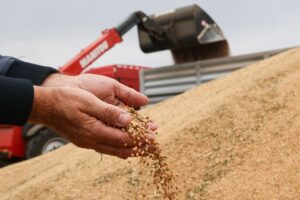
USAID’s Urozhay program has announced the launch of a tender for the supply of mobile grain dryers for farmers in frontline regions to store grain in the 2024 season, the donor organization reported on its Facebook page.
“Due to a lack of funds and access to quality drying equipment, many farmers leave part of their crops in the field unharvested until spring. This leads to a loss of quality and value,” USAID Urozhay noted.
The donor organization invited suppliers to register for a pre-application seminar by August 21. The seminar itself will take place on August 22. Proposals for the supply of mobile grain dryers must be sent no later than 18:00, September 5, 2024, to harvest.subcontracts@harvestukraine.com.
The requirements for suppliers can be found here: https://shorturl.at/O0ZiX.
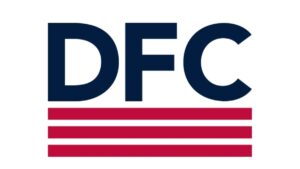
Representatives of the U.S. Corporation for International Development (DFC) have started working in Ukraine on a permanent basis.
“The AmCham Ukraine team held a productive meeting with Caitlin Candee, Project Finance and Political Risk Insurance Specialist, and Anthony Pollak, Investment Advisor, from DFC, who are now represented in Ukraine on a permanent basis,” AmCham Ukraine said in a Facebook post.
According to Pollak’s LinkedIn profile, he has been working in Kyiv on behalf of DFC since July of this year, and a little earlier, in June 2024, he began representing the CrossBoundary group as an investment advisor in Kyiv.
In addition, DFC, the U.S. government’s development finance institution, the successor to OPIC, has launched a special website dedicated to its work in Ukraine. It is noted that before Russia’s full-scale invasion, DFC’s investments in Ukraine amounted to $800 million, but since the beginning of 2022, they have increased by $848 million, or more than doubled. Thus, DFC’s total portfolio as of August 12 was approximately $1.6 billion.
Source: https://interfax.com.ua/
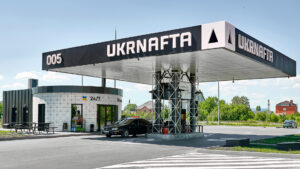
Ukrnafta JSC together with the Come Back Alive Foundation have delivered 40 FN Minimi machine guns to the 82nd separate air assault brigade.
“This reliable and proven weapon is now helping the soldiers perform special combat missions. The company has allocated UAH 25.3 million for the purchase,” Ukrnafta CEO Sergiy Koretsky said on Facebook.
He also clarified that in 2023 alone, Ukrnafta allocated almost UAH 1.3 billion for the purchase of pickup trucks, armored vehicles, grenade launchers, drones and other equipment needed by the defenders.
“Ukrnafta is Ukraine’s largest oil producer and operator of a national network of gas stations.
In March 2024, the company took over the management of Glusco’s assets and operates a total of 545 filling stations – 460 owned and 85 managed.
The company is implementing a comprehensive program to restore operations and update the format of its filling stations. Since February 2023, Ukrnafta has been issuing its own fuel coupons and NAFTAKarta cards, which are sold to legal entities and individuals through Ukrnafta-Postach LLC.
Ukrnafta’s largest shareholder is Naftogaz of Ukraine with a 50%+1 share. In November 2022, the Supreme Commander-in-Chief of the Armed Forces of Ukraine decided to transfer to the state a share of corporate rights of the company, which belonged to private owners and is currently managed by the Ministry of Defense.
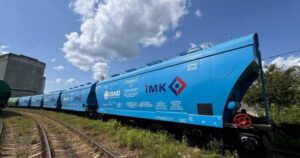
In 2024, IMC Agro Holding will invest $12 million in grain carriers, Chairman of the Board of Directors Alex Lissitsa said in an interview with German radio deutschlandfunk.de.
“Things are much better now, especially because we have finally returned (to the de-occupied territories where the agricultural holding operates – IF-U). We are able to export. It is a huge advantage for us to export across the western border by rail. It used to be very difficult and expensive for us. Now everything is going well,” he said.
According to Lissitsa, the normalization of IMC’s operations after the de-occupation of the territories and the resumption of exports allowed the agricultural holding to resume investments in 2024.
“Now we have $12 million in investments in grain carriers (Pfeidewagen). We also have a number of other investments planned. Therefore, things are much better now than two years ago,” said the Chairman of the Board of Directors of IMC.
Commenting on the publication of his book “My Wild Nation. Ukraine on the Road to Freedom”, Mr. Lissitsa explained that the agricultural holding is currently working with the government to identify priorities for the economic recovery of Ukraine in the next few years.
He noted that only half of the decisions made under the Ukraine Facility program have been implemented. The issue is the need to take advantage of the opportunities in the agricultural sector during Ukraine’s integration into the European Union.
“There are many things that are a bit painful for us. For example, the use of all kinds of pesticides, the use of drones, and so on, where Ukrainian agriculture has already had a significant advantage. I think that for many people in Ukraine, this (integration – IF-U) will be painful, but nothing more. It is feasible. After all, we want it,” Lissitsa assured.
According to him, Ukraine’s “savagery” is not chaos or uncontrollability.
It is the unwavering will of the Ukrainian people to freedom and self-determination on the path to EU membership.
Speaking about the upcoming Independence Day, which will be celebrated for the third time during Russia’s full-scale invasion of Ukraine, Lissitsa clarified that there will be no celebrations in the country. However, Ukrainian President Volodymyr Zelenskyy has already initiated a meeting with farmers next week to discuss the current situation in the agricultural sector.